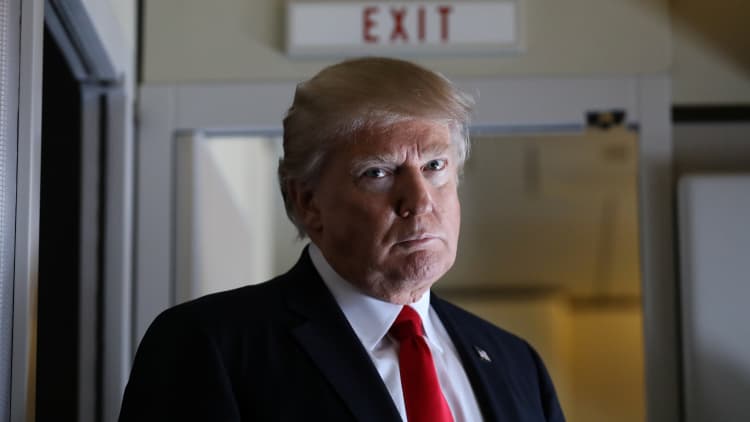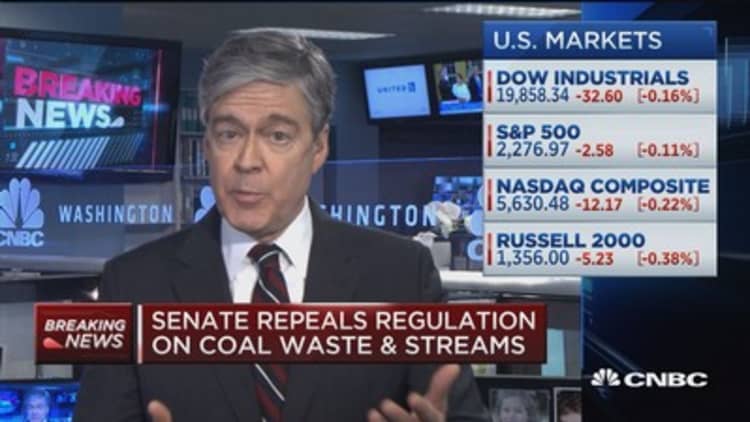
Keep one rule in mind about President Donald Trump's deregulation moves so far: the bigger it sounds, the smaller its actual importance.
The hard-charging Republican president and his new administration have some very big regulatory targets. They include such Obama administration initiatives as the Clean Power Plan cutting carbon emissions, a Labor Department rule mandating expanded overtime pay and FCC "net neutrality" regulations requiring internet providers to treat large and small content providers equally.
But for different reasons, all three will require more time and effort to undo.
At the same time, Trump has used his presidential pen to issue three directives signaling grand ambition.
One demanded a comprehensive administration review of financial regulation, foreshadowing the "big number" the president has promised to do on Wall Street regulations. A second told members of his administration to spare affected parties from hardship under regulations implementing Obamacare. A third declared that administration officials would eliminate two old regulations for every new one they implement — and ensuring that the trade adds no costs on business.
But the first is largely hortatory, setting the table for an effort that will require Congress to pass a new law to replace the Dodd-Frank law it passed in 2010. The second, if aggressively implemented, would hasten the disruption of health insurance markets that Trump himself has warned against before Republicans pass a replacement health-care plan.
The third points toward a broad shift in the way the federal government has evaluated major regulations for decades. In practice, however, it may not have much effect beyond signaling a new approach by a Republican-controlled Washington.
Presidents since Ronald Reagan have overseen cost-benefit analyses to assess the merit of new regulations. Aside from calculating the implementation burdens on government and private businesses, that process assigns a value to gains for society. In transportation policy, that could mean things such as lives saved through requiring air bags in cars; in environmental regulation, it could mean estimating health benefits through reduced pollution. The new Trump policy of zero net cost from new regulation concerns only private sector costs, not societal gains.
Veteran Democratic officials — even those who favor reducing regulations — call that a straitjacket inhibiting regulations that even business executives might embrace.
"Economists have long been concerned about regulatory analysis that focuses only on benefits and excludes costs," said Peter Orszag, Obama's first budget director. "This is now going to the opposite extreme, and taking no account of benefits. Do we really want to block regulations that impose $1 in costs but produce $10 or even $100 in benefits? Very few regulations that do anything at all impose literally zero private sector costs."

In theory, the requirement of eliminating two regulations for every new one would offset those costs. But conservative advocates of regulatory reform say that system is susceptible to the same sort of imprecision, guesstimation and bureaucratic game playing that they have long found in the existing system.
"I'm a bit skeptical of 2-for-1," said James Gattuso, a regulatory expert at the conservative Heritage Foundation. "The reform itself seems to be a bright shiny object that might not do that much.'
In Canada and Britain, Gattuso explained, similar changes have reduced some paperwork burdens but not had major economic impact. "The effect it might have is message-sending, not just to the public at large but to his own regulators," he added.
That doesn't mean big changes aren't coming to Washington's regulatory apparatus. But it means that the most significant ones will require passing new laws.
Republicans on Capitol Hill have gotten off to a quick start, using procedures under the Congressional Review Act to scrap recent Obama administration rules designed to protect streams near coal mines and force energy companies to disclose payments to foreign governments. They have cleared both houses on the way to Trump's desk for his signature, with more on the way this week.
Heritage estimates that existing federal regulations load more than $100 billion in costs onto the American economy, nearly half that amount through environmental rules. Trump and his party have lots more work to do to shave that down.


